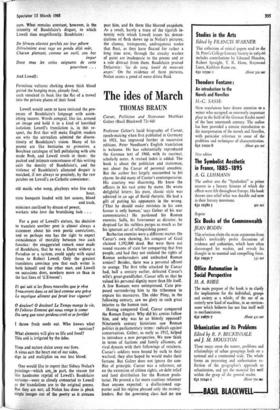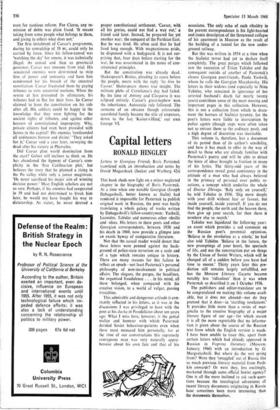The ides of March
THOMAS BRAUN
Professor Gelzer's lucid biography of Caesar, epoch-making when first published in Germany in 1921, has improved further in successive editions. Peter Needham's English translation is welcome. He has substantially reproduced the German text of 1960, with its succinct, scholarly notes. A revised index is added. The book is about the politician and statesman, not about the Caesar of personal anecdote. But the author has largely succumbed to his charm. So did many of Caesar's contemporaries. His courtesy was disarming. He knew the officers in his vast army by name. He wrote delightful letters; his pure, classic style was admired in an age of florid rhetoric. He had a gift of putting his opponents in the wrong. ('That he should make mistakes in his own favour is only human,' says Gelzer of his war commentaries.) He pardoned his Roman enemies. Sulla, his forerunner as dictator, he despised for his ruthless purges as much as for his ignorant act of relinquishing power.
Barbarian enemies were a different matter. On Caesar's own showing, his conquest of Gaul claimed 1,192,000 dead. But were there not sound reasons of state for conquering that free people, and had they not violated the rights of Roman ambassadors and ambushed Roman armies? Besides, there was a personal affront to avenge. The first tribe attacked by Caesar had, half a century earlier, defeated Caesar's wife's great-grandfather. Caesar tells us that he valued his personal dignity more than life itself. A few Romans were unimpressed. Cato pro- posed surrendering him to the tribesmen to expiate his massacres. The elder Pliny, in the following century, saw no glory in such great injuries to the human race.
Having conquered Gaul, Caesar conquered the Roman Empire. Why did his armies follow him, and why was he so bitterly opposed? Nineteenth century historians saw Roman politics in parliamentary terms: radicals against conservatives. Gelzer, as early as 1912, helped to introduce a new perspective. We now think in terms of factions and family alliances, of rival dynasts with their followings of retainers. Caesar's soldiers were bound by oath to their warlord; they also hoped he would make their fortune. But Gelzer does not ignore the con- flict of principle. Caesar was a reformer, set on the extension of citizen rights, on debt relief and land distribution for the Roman prole- tariat. He proved a far more cautious reformer than anyone expected: a disillusioned sup- porter said his regime pleased only the money- lenders. But the governing class had no use even for cautious reform. For Cicero, any re- mission of debts was plain fraud. 'It means taking from some people what belongs to them, and giving to others what does not.'
The first instalment of Caesar's programme, during his consulship of 59 BC, could only be carried by force. Since his fellow-consul was `watching the sky' for omens, it was technically illegal. As consul and then as provincial governor, Caesar was immune from trial. His senatorial enemies were determined to strip him of power and immunity and have him condemned for his breach of the ancestral constitution. Caesar frustrated them by paying tribunes to veto senatorial motions. When the senate at last presented its ultimatum, his tribunes had to flee for their lives. So Caesar claimed to have the constitution on his side after all. His soldiers could be happy in the knowledge that they were fighting for the ancient rights of tribunes, and against other horrors of constitutional impropriety. Why, private citizens had even been provided with lictors in the capital! His enemies 'confounded all ordinances human and divine.' They asked for it,' Caesar said a year later, surveying the dead after his victory at Pharsalus.
Did Caesar plan world domination from the start? Gelzer still inclines to think so. He has abandoned the figment of Caesar's com- plicity in the 'first Catilinarian plot,' but believes the story that he planned a rising in the Po valley while only a junior magistrate. 'He never sacrificed his major aim of winning decisive power.' Most English scholars are not so sure. Perhaps, if his enemies had cooperated in 59 and had not determined to. break him later, he would not have fought his way to dictatorship. As_ victor, he never devised a proper constitutional settlement. 'Caesar, with all his genius, could not find a way oue a friend said later. Instead, he prepared for yet another war: the conquest of the Parthian East. But he was tired. He often said that he had lived long enough. With magnanimous pride, he dispensed with a bodyguard. It is not sur- prising that, four days before starting for the war, he was assassinated in the name of con- stitutional principles.
But the constitution was already dead. Shakespeare's Brutus, pleading its cause before the people, meets with the reply let him be Caesar.' Shakespeare shows true insight. The militant plebs of Coriolanus's day had failed. By the time of Antony and Cleopatra it was eclipsed entirely. Caesar's great-nephew won the inheritance. Autocratic rule followed. The surname of an obscure though aristocratic sacerdotal family became the title of emperors, down to the last `Kaiser-i-Hind,' our own George VI.











































 Previous page
Previous page